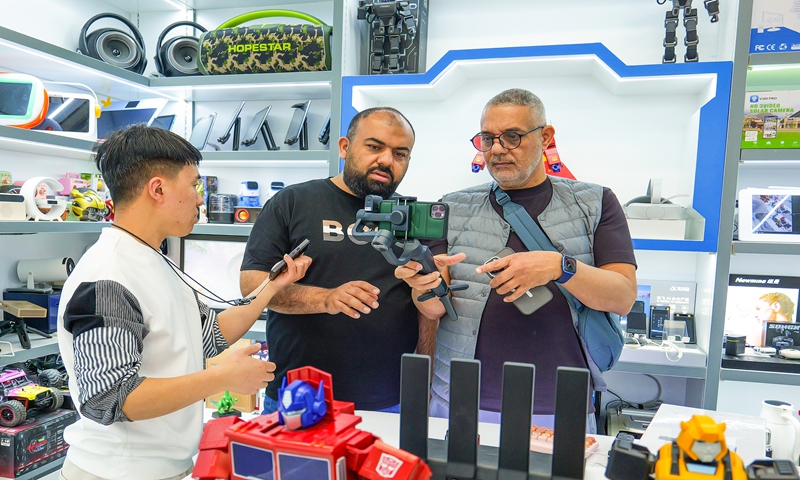
A seller uses an AI translator to negotiate with foreign buyers at the Yiwu International Trade City in Yiwu, East China’s Zhejiang Province on April 15, 2025. Photo: VCG
“Artificial intelligence (AI) glasses are sold out. We’ve only got these few samples left, and they’re not for sale,” said Wang Junwen, CEO of Yangyang Digital Technology Co in Yiwu International Trade City, with an apologetic smile, as she waved bye-bye to groups of customers. Since putting AI-series electronics on the shelves in May, Wang has received swarms of overseas buyers daily.
Wang revealed that since many Chinese companies launched their AI glasses in 2025, their sales have taken off. AI glasses at her store have often been out of stock, with her factory in Shenzhen, South China’s Guangdong Province, working day and night to meet the surging demand.
Increasingly smart devices
“I’ve been in the digital products business for 12 years, always hunting for new and trending items, and I often study new tech,” Wang told the Global Times, adding that she created some of the product images for her online store with AI assistance.
Wang is symbolic of the countless merchants in Yiwu, the world’s largest wholesale market of commodities, in East China’s Zhejiang Province. As the AI wave sweeps on, owners at the “world’s supermarket” – Yiwu International Trade City – are using AI to enhance communication and boost sales, turning the cutting-edge technology into many accessible smart goods tailored for the world market.
As the “weathervane” of global small commodity trade, Yiwu has always been a pioneer in embracing digitalization. Currently, more than 30,000 merchants are using AI tools to assist daily operations, and their business revenues are rising by more than 30 percent year-on-year, according to statistics from the Yiwu municipal government.
And, the era of AI-generated content has arrived, making “everything AI-powered” a vivid reality, not just a distant dream. While many use AI to assist work, Yiwu merchants are ahead of the curve, accelerating AI’s leap from “lab” to “applications,” embedding it into small commodities as early adopters, Yiwu merchants told the Global Times.
They identify many wearable devices that are enhanced with AI functions, including AI glasses for photo and video capturing, AI ear-buds with real-time translation to break language barriers, AI watches offering instant answers like personal advisors, and AI translators mastering global languages as a cultural bridge.
“This introduction of AI features into daily products, such as glasses and earphones, is an upgrade iteration based on the original product,” Wang said. She believes that AI wearable devices have huge potential to tap in the international market.
The AI-powered products launched by Yiwu not only demonstrate the rapid development of China’s AI technology, but also reflect the country’s strong industrial chain advantages, industry observers said.
Adding high-tech functions
Meanwhile, Yiwu’s traditional “small commodities” are gaining technological enhancement too, with many emerging as new hits at overseas markets.
A hat with solar-powered fans has been trending on overseas social media platforms; an umbrella with a mist-spray mode has turned into a popular item in the Middle East market; and smarter compact machinery has gradually become a must-buy for gardeners in Europe.
Zhang Jiying, general manager of a Yiwu-based umbrella producer, has her own story to tell. She astutely tapped into overseas market demand, crafting mist-spraying cooling umbrellas for many Middle Eastern clients and expanding umbrella sizes to 140 centimeters for customers in Saudi Arabia able to accommodate two or three people.
“Our initial export of 3,000 fan umbrellas was quickly followed by reorders,” Zhang told the Global Times.
Jiang Yongtao, general manager of Zhejiang Senwai Garments Co, saw his company’s solar-powered fan hats achieve 3.2 million yuan ($445,378) in sales within 28 days of product release. By the end of July, the company had sold over 500,000 of the innovative fan hats, within just one month of their release, said Jiang.
Ahead of the Father’s Day in June, this year, a US influencer showcased a hat as a perfect gift in a TikTok video clip, which garnered more than 9 million views, triggering a wave of enthusiastic buyers. The featured product – a sun hat equipped with two solar-powered fans for a refreshing summer experience – originates in Yiwu city. Zhejiang Senwai Garments is the patent holder for the hat’s design and development
From a single hat to an entire industrial chain, Yiwu relies on speedy innovation to excel in smart manufacturing.
Yiwu’s “summer hit” products, like the solar fan hat, represent a new “small but beautiful” business model – demand-driven, rapidly gaining popularity through short-video platforms, and achieving efficient sales through cross-border e-commerce channels.
Innovative designs, diverse varieties, and cost-effectiveness have made many distinctive Chinese products best-sellers globally, earning widespread acclaim from consumers worldwide.
And, Yiwu manufacturers are building up their own brands too, which showcases the rapid transition of Chinese traditional manufacturing toward smarter, high-quality development.
In 1997, Zhang started her own small business with a one-square-meter stall in Yiwu. In 2010, she began building her own business brand, and by 2013, leveraging the Belt and Road Initiative, she had registered trademarks in more than 100 countries and regions, selling more than 3,000 self-designed products.
By meeting the customers’ needs, segmenting the market demand, and winning with quality, craftsmanship, and creativity, Yiwu’s small commodities have already been turned into big business, propelling Chinese manufacturing toward Chinese innovation and branding.

